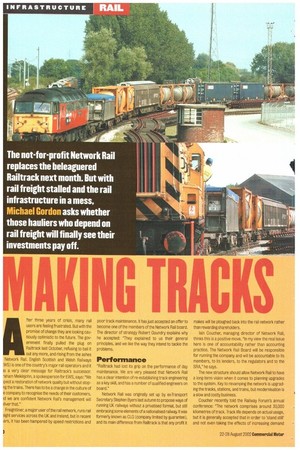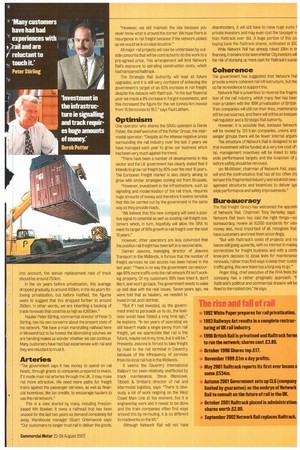flAKING TRACKS
Page 40

Page 41

If you've noticed an error in this article please click here to report it so we can fix it.
1 i fter three years of crisis, many rail users are feeling frustrated. But with the promise of change they are looking cautiously optimistic to the future. The government finally pulled the plug on Railtrack last October, refusing to bail it out any more, and rising from the ashes Network Rail. English Scottish and Welsh Railways :WS) is one of the country's major rail operators and it is a very clear message for Railtrack's successor. -aham Meiklejohn, a spokesperson for EWS, says: "We ;pect a restoration of network quality but without stopng the trains. There has to be a change in the culture of e company to recognise the needs of their customers, id we a 'e confident Network Rail's management will :liver th Freight liner, a major user of the rail network, runs rail Right se vices across the UK and Ireland, but in recent :ars, it h as been hampered by speed restrictions and poor track maintenance. It has just accepted an offer to become one of the members of the Network Rail board. The director of strategy Robert Goundry explains why he accepted: "They explained to us their general principles, and we like the way they intend to tackle the problems.
Performance
"Railtrack had lost its grip on the performance of day maintenance. We are very pleased that Network Rail has a clear intention of re-establishing track engineering as a key skill, and has a number of qualified engineers on board."
Network Rail was originally set up by ex-Transport Secretary Stephen Byers last autumn to propose ways of running UK railways without a privatised format, but still embracing some elements of a nationalised railway. It was formerly known as CLG {company limited by guarantee), and its main difference from Raittrack is that any profit it
makes will be ploughed back into the rail network rather than rewarding shareholders.
lain Coucher, managing director of Network Rail, thinks this is a positive move. "In my view the real issue here is one of accountability rather than accounting practice. The Network Rail Board will be responsible for running the company and will be accountable to its members, to its lenders, to the regulators and to the SRA," he says.
The new structure should allow Network Rail to have a long-term vision when it comes to planning upgrades to the system. Key to revamping the network is upgrading the tracks, stations, and trains, but modernisation is a slow and costly business.
Coucher recently told the Railway Forum's annual conference: "The network comprises around 30,000 kilometres of track. Track life depends on actual usage, but it is generally accepted that in order to 'stand still' and not even taking the effects of increasing demand
into account, the annual replacement rate of track should be around 750km.
In the six years before privatisation, this average dropped gradually, to around 400km; in the six years following privatisation, but before Hatfield, the figures seem to suggest that this dropped further to around 350km. In other words, we are inheriting a backlog of track renewals that could be as high as 4,500km."
Haulier Peter Stirling, commercial director of Peter Stirring, has his own concerns about the present state of the network. "We have a main marshalling railhead here in Mossend but to be honest the diminishing volumes we are handling makes us wonder whether we can continue. Many customers have had bad experiences with rail and they are reluctant to trust it,
Arteries
"The government says it has money to spend on rail heads, through grants to companies prepared to invest. If it made main rail arteries through the UK, it may make rail more attractive. We need more paths for freight trains against the passenger services, as well as financial incentives, like tax credits, to encourage hauliers to use the rail network.'
This is a view shared by many, including Prestonbased WH Bowker. It owns a railhead that has been unused for the last two years as demand completely fell away. Warehouse manager Stuart Greenwood says: "Our customers no longer trust rail to deliver the goods. "However, we still maintain the site because you never know what is around the corner. We hope there is resurgence in rail freight because if the network picked up we would be in an ideal situation."
All major rail projects will now be undertaken by outside consortia that will be contracted to do the work to a pre-agreed price. This arrangement will limit Network Rail's exposure to spiralling construction costs, which had hampered Railtrack.
The Strategic Rail Authority will lead all future upgrades, and it is still very confident of achieving the government's target of an 80% increase in rail freight despite the debacle with Railtrack, "In the last financial year we made a 9% increase in freight movements, and this increased the figure for the net tonnes/km moved from 181bn tonnes to 19.7," says Paul Latham.
Optimism
One operator who shares the SRA's optimism is Derek Potter, the chief executive of the Potter Group, the intermodal operator: "Despite all the intense negative press surrounding the rail industry over the last 3 years we have managed each year to grow our business which has been very much against the trend.
"There have been a number of developments in this sector and the UK government has clearly stated that it intends to grow rail freight by 80% over the next 10 years. The European Freight market is also clearly aiming to grow with similar strategies coming out from Brussels.
"However, investment in the infrastructure, such as signalling and modernisation of the rail track, requires huge amounts of money and therefore it seems sensible that this be carried out by the government in the same way as they provide roads.
"We believe that this new company will send a positive signal to potential as well as existing rail-freight customers which, in turn, hopefully will allow the SRA to meet its target of BO% growth in rail freight over the next 10 years."
However, other operators are less convinced that the position rail freight has been left in is recoverable.
Darren Jeavons, managing director of Jeavons Transport in the Midlands, is furious that the number of freight services he can access has been halved in the last year: "There is no way the government can encourage 80% more traffic onto the rail network if it isn't working properly. Of my customers 99% have tried it, don't like it, and won't go back. The government needs to wake up and deal with the real issues. Seven years ago, we were told that as hauliers, we needed to invest in rail, and I did that.
"But if I had invested, as the government tried to persuade us to do, the business would have folded a long time ago," he explains. "In ten years of operating we still haven't made a single penny from rail freight, yet we appreciate that rail is the future, maybe not in my time, but it will be." Presently Jeavons is forced to take freight by road to the rail terminal in Daventry because of the infrequency of services from his local rail hub in the Midlands.
It seems the Daventry International Railport has been relatively unaffected by track maintenance. Steve Blencowe, Tibbett & Britten's director of rail and intermodal logistics, says: "There is obviously a lot of work ongoing on the West Coast Main Line at the moment, but it is engineering work and it needs to be done and the train companies often find ways around this by re-routing. It is no different to roadworks on the Ml."
Although Network Rail will not have shareholders, it will still have to raise huge sums private investors and may even cost the taxpayer r than Railtrack ever did. A huge portion of this co buying back the Railtrack shares, estimated at £5(
While Network Rail has already raised £9bn in bi financing, it remains to be seen whether City investors will the risk of stumping up more cash for Railtrack's succe
Coherence
The government has suggested that Network Rai provide a more coherent rail infrastructure, but the so far no evidence to support this.
Network Rail is powerless to reverse the fragrre tion of the rail industry, which many feel has beer main problem with the 1996 privatisation of British Train companies will still run their lines, maintenano still be out-sourced, and there will still be an indepen rail regulator and a Strategic Rail Authority.
However, it is possible that, because Network will be owned by 120 train companies, unions and senger groups there will be fewer internal argumi The structure of Network Rail is designed to en that investment will be funded at a very low cost of tal, management incentives will be linked to indu wide performance targets and the suspicion of r before safety should be removed.
Ian McAllister, chairman of Network Rail, says: will end the confrontation that has all too often cfe tensed this fragmented industry and establish new agement structures and incentives to deliver sys wide performance and safety improvements."
Bureaucracy
The Rail Freight Group has welcomed the appoint of Network Rail. Chairman Tony Berkeley says: Network Rail team has said the right things—cu bureaucracy, review all 10,000 standards for vale money and, most important of all, recognise that have customers and treat them accordingly.
"But with Railtrack's costs of projects and rye nance still going upwards, with no interest in makine connections for freight business and with a conel knee-jerk decision to close lines for maintenance renewals, rather than find ways to keep their custor traffic going, this new team has a long way to go."
Roger King, chief executive of the RHA feels thE company has a rather pragmatic approach. "F Railtrack's political and commercial dreams will be fined to the rubbish bin," he says.
















































































































































